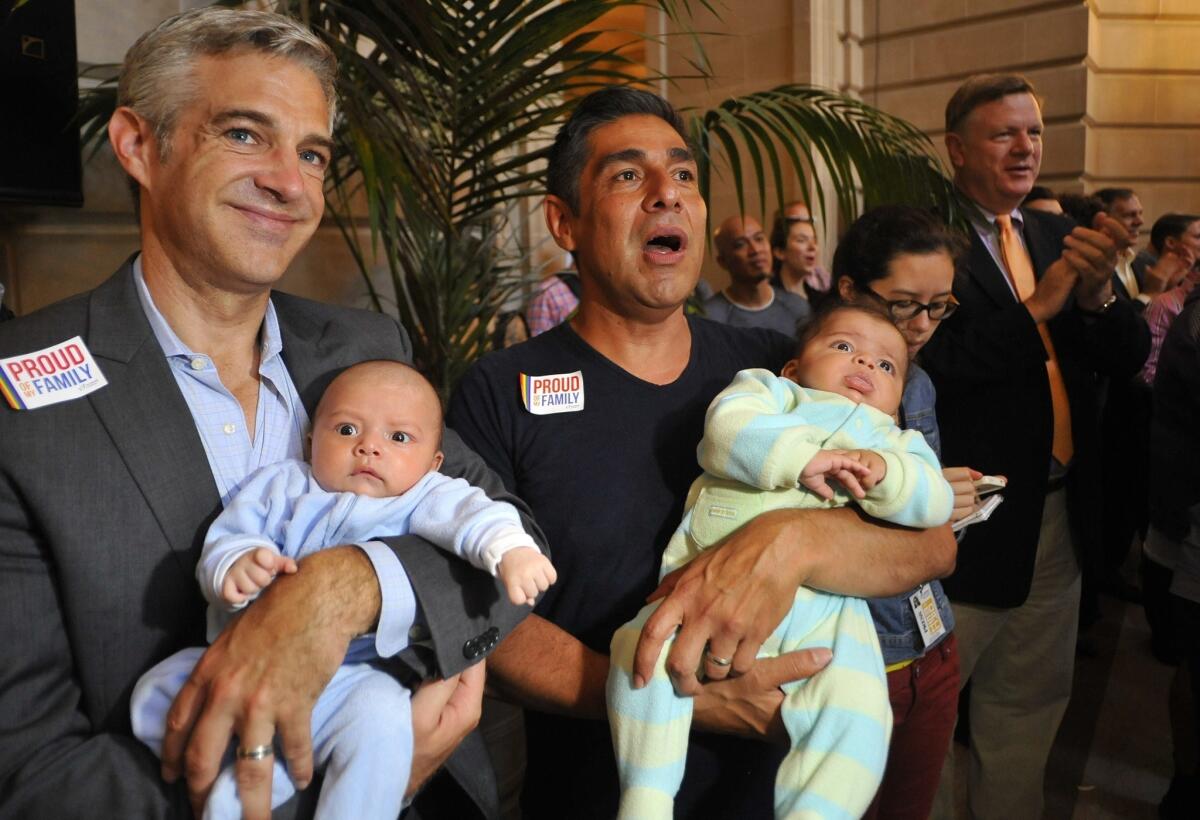DOMA, Prop. 8 and marriage: An anthropologist’s view

- Share via
Buried in the Supreme Court’s decision Wednesday that the Defense of Marriage Act was unconstitutional was a phrase that captures what is at stake in the rapidly changing landscape of marriage rights in the United States: “A dignity and status of great import.”
Debate on this case and on California’s ban on same-sex marriage, Proposition 8, often seemed to equate the “import” of marriage with economic benefits. Edith Windsor, the plaintiff in the DOMA case, had sought a refund of federal estate taxes she was forced to pay when her wife, in a marriage recognized by New York state, died. She won both in federal court and on appeal, when the courts ruled that DOMA denied Windsor equal protection under the Constitution.
In the meantime, the attorney general informed Congress that it would no longer defend DOMA, but it also would not refund the tax payment. The Supreme Court agreed to take the case, with a group representing the House of Representatives defending DOMA. This is a reminder that in the United States, the regulation of marriage by governments serves largely economic purposes.
VIDEO: Understanding the Prop. 8 and DOMA decisions
These purposes are sometimes awkwardly juxtaposed to other understandings of marriage, the kind that draw forth rhetoric about marriage having “always been” between a man and a woman, appeals to tradition that are also part of the framework of the Supreme Court decision on DOMA.
In the majority opinion, the justices write that, “by history and tradition,” marriage has been a matter for the states. “When the Constitution was adopted, the common understanding was that the domestic relations of husband and wife and parent and child were matters reserved to the states.” Accepting New York state’s redefinition of marriage, the Supreme Court argued that it reflected “the community’s considered perspective on the historical roots of the institution of marriage.”
The majority opinion, written by Justice Anthony M. Kennedy, contains an extraordinarily clear reprise of one of the most common claims made during debates on marriage rights over the last few years: “Marriage between a man and a woman no doubt had been thought of by most people as essential to the very definition of that term and its role and function throughout the history of civilization.”
DECISION: U.S. Supreme Court overturns DOMA
I am not “most people” in this formulation. I am an anthropologist. For me, the arguments about these cases have provided a clear illustration of the need for my discipline’s perspective on what marriage has been throughout history and across the wide span of human societies. As the American Anthropological Assn. wrote in 2004, “Anthropological research supports the conclusion that a vast array of family types, including families built upon same-sex partnerships, can contribute to stable and humane societies.”
We don’t have to go far afield to question the idea that marriage has always been defined the same way. As U.S. District Judge Vaughn Walker argued eloquently in his opinion striking down Proposition 8 in California, in the history of the United States, marriage once inscribed unequal relations between a man and woman, placing the wife entirely under the economic and social authority of her husband. Marriage, he noted, was once illegal between members of different racial backgrounds. These conditions changed. What makes it impossible to accommodate same-sex couples who want to marry today?
During oral arguments before the Supreme Court on the Proposition 8 case, proponents of the restriction of marriage to male-female couples claimed that “redefining marriage as a genderless institution will sever its abiding connection to its historic traditional procreative purposes.” As Justices Elena Kagan and Stephen G. Breyer made clear in their questions, this formulation would seem to define childless couples as unfit for marriage as well, and raises the question of how adoption might affect marriage as an institution.
FULL COVERAGE: Prop. 8 and DOMA
In 2004, anthropologists John Borneman and Laurie Kain Hart noted in the Washington Post that marriage “provides a recognized form of identity and security for children in society,” whether the children are biologically related to their parents or not. That would actually seem to be an argument for extending the marriage franchise, to allow more children the security of legitimacy.
Yet studies of human social life show that marriage is not solely important for children. As Borneman and Kain Hart wrote, “In most societies known to us, everyone marries; it is an expected rite of passage and part of the normal life course of all adults.”
This is what people intuitively understand, and what the court, in calling marriage “a dignity and status of great import,” recognized. There is no reason that some adults should be denied the opportunity for that dignity, and no history that should prevent us from opening opportunity to all who want that status.
Rosemary Joyce is a professor of anthropology and associate dean of the graduate division at UC Berkeley.
More to Read
A cure for the common opinion
Get thought-provoking perspectives with our weekly newsletter.
You may occasionally receive promotional content from the Los Angeles Times.









